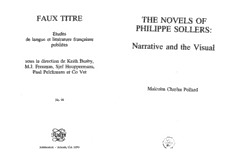
The Novels of Philippe Sollers: Narrative and the Visual (Faux Titre) PDF
88 Pages·1994·5.001 MB·English
Most books are stored in the elastic cloud where traffic is expensive. For this reason, we have a limit on daily download.
Preview The Novels of Philippe Sollers: Narrative and the Visual (Faux Titre)
Description:
It is easy simply to attribute the high profile of Sollers, the numerous autobiographical details in his novels, and also the espousal of so many different views and causes, to egocentrism and opportunism. Alternatively, one could say that they are all significant elements in an ongoing enquiry into the role of fiction in a society where attitudes are often thought to be determined more by images than by the written word. Given Sollers's questioning of society's conventional images (as in Debord's notion of the 'spectacle'), his awareness of his own role in the media, and his interest in developing a discourse on the visual arts, how do such concerns come together to create new forms of fiction and a coherent aesthetics? These seemingly disparate questions are all in fact related to Sollers's desire to challenge the accepted parameters of representation by creating an alternative scene in the novel, a subject which forms the basis of this book.
See more
The list of books you might like
Most books are stored in the elastic cloud where traffic is expensive. For this reason, we have a limit on daily download.
